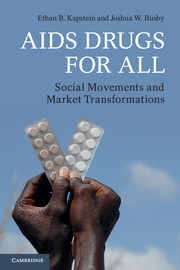Book contents
- Frontmatter
- Contents
- Preface
- Figures
- Tables
- Abbreviations
- 1 Introduction: global markets and transnational social movements
- 2 Industry structure and movement opportunities
- 3 Drugs = life: framing access to AIDS drugs
- 4 Movement coherence and mobilization
- 5 Advocacy strategies to address costs
- 6 Institutions to stabilize the market
- 7 Lessons for other campaigns
- 8 Conclusions: implications for research and policy
- References
- Index
1 - Introduction: global markets and transnational social movements
Published online by Cambridge University Press: 05 June 2014
- Frontmatter
- Contents
- Preface
- Figures
- Tables
- Abbreviations
- 1 Introduction: global markets and transnational social movements
- 2 Industry structure and movement opportunities
- 3 Drugs = life: framing access to AIDS drugs
- 4 Movement coherence and mobilization
- 5 Advocacy strategies to address costs
- 6 Institutions to stabilize the market
- 7 Lessons for other campaigns
- 8 Conclusions: implications for research and policy
- References
- Index
Summary
In the beginning there were markets.
Oliver Williamson, Markets and Hierarchies, 1983, 20In the end, if we don't have drugs, people are going to die.
AIDS Activist Gregg Gonsalves, Interview, ACT UP Oral History Project, 19 July 2004Markets are mechanisms for allocating goods and services. But what if some people are unhappy with the outcomes of market-based distributions? How can the allocation of goods and services be changed or transformed? Take, for example, the market for life-extending AIDS drugs, which provides our focal point. Ever since the appearance of these drugs in the 1980s, their very nature as economic goods has been hotly debated by stakeholders around the world. Are antiretroviral (ARV) drugs intrinsically private goods, like computers or cars? Or are they public goods that every member of society should have access to, like clean air or national security? Raising these questions suggests that the very nature of a good can be contested, its supply, demand, and price the subject of political debate.
This book is about a profound change that occurred in the allocation of life-extending ARV medications, from a model that was “high price, low volume” to one based on “universal access to treatment.” We argue that advocates, including AIDS activists around the world, policy entrepreneurs in national governments and international institutions, and even some corporate executives who became devoted to this cause, challenged the market structure for these drugs, from one based on “ability to pay” to one based on “universal access.” We show how social activists and their allies in government and business (we use the umbrella term “advocates” to refer to all those who made common cause in the campaign for universal access to AIDS treatment) helped transform ARVs from private goods into “merit goods,” or private goods which everyone should have access to, regardless of their ability to pay for them. We then consider the lessons from the AIDS case for several other market arenas both within and outside public health.
- Type
- Chapter
- Information
- AIDS Drugs For AllSocial Movements and Market Transformations, pp. 1 - 31Publisher: Cambridge University PressPrint publication year: 2013



